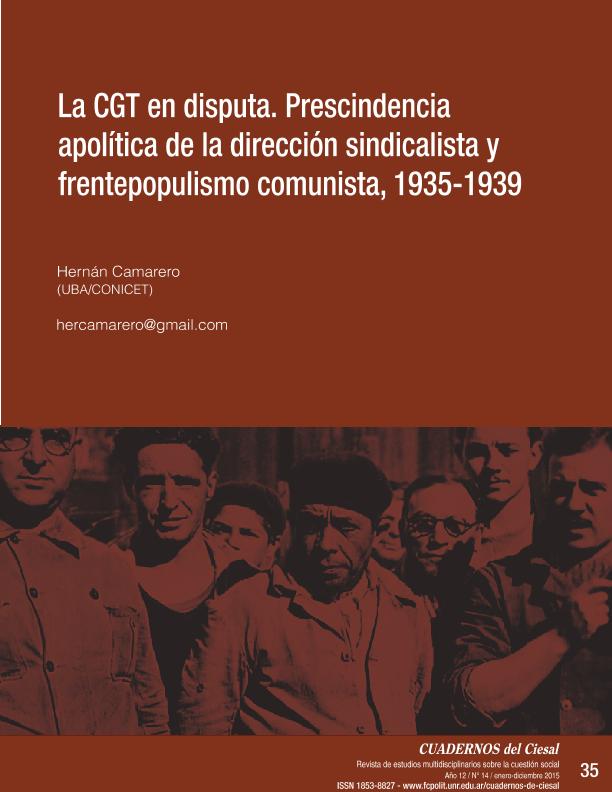Mostrar el registro sencillo del ítem
dc.contributor.author
Camarero, Hernán

dc.date.available
2018-05-18T12:51:36Z
dc.date.issued
2015-12
dc.identifier.citation
Camarero, Hernán; La CGT en disputa: prescindencia apolítica de la dirección sindicalista y frentepopulismo comunista, 1935-1939; Universidad Nacional de Rosario. Facultad de Ciencia Política y Relaciones Internacionales; Cuadernos del CIESAL; 12; 14; 12-2015; 35-58
dc.identifier.issn
0327-9634
dc.identifier.uri
http://hdl.handle.net/11336/45527
dc.description.abstract
La Confederación General del Trabajo (CGT) experimentó un importante crecimiento durante los años 1930. En su primer lustro desplegó un comportamiento moderado frente a los gobiernos de la “década infame”. Debido al predominio de los dirigentes sindicalistas, tuvo un perfil apolítico, neutralista y hostil a cualquier acción conjunta tanto con el Partido Socialista (PS) como con el Partido Comunista (PC). Ello pareció superarse con la ruptura de la CGT en 1935, cuando el grueso del elenco sindicalista quedó fuera de la dirección y de la propia central, la cual cayó en manos de los militantes del PS y algunos otros sindicalistas, a los que se agregó el PC. Con el paso de los años, sin embargo, la relación de la CGT con los partidos de izquierda volvió a resquebrajarse. La conducción cegetista, incluso, buena parte de los cuadros gremiales del propio socialismo (autonomizados de la tutela partidaria), volvieron a reafirmar las concepciones antipolíticas y prescindentes. Ello fue crecientemente impugnado desde el PC y el PS. En este artículo se examinan los análisis y posiciones de la izquierda partidaria frente a este nuevo curso apolítico de la CGT. Se prioriza la posición del PC, pues fue la fuerza partidaria que más claramente enfrentó ese planteo neutralista. El ciclo 1935-1939 permite comprender los conflictos que condujeron a la ruptura cegetista previa al golpe militar del 4 de junio de 1943.
dc.description.abstract
The Argentinean General Confederation of Labour (in Spanish, Confederación General del Trabajo, CGT) grew considerably over the 1930s. During its first five years, the organization had a temperate attitude towards the administrations of the so-called “Infamous Decade”. Due to the predominance of union leaders, the CGT had a non-political profile, a neutralist and even hostile approach towards any joint action with the local Socialist Party (SP) and Communist Party (CP). This was apparently outgrown with the breach of the CGT in 1935, when most of the union’s main characters were left out of the direction and the CGT itself, which fell into the hands of SP’s militants, some other unionists and later, also the CP. Over the years, however, the CGT relationship with left-wing parties was deteriorated once again. The CGT direction and a significant amount of Socialist union leaders who had become independent from partisan influence, once more felt the need to renew the independentist and non-political approach. This was increasingly challenged by the CP and the SP. Our work examines the analysis and positions of the left-wing parties regarding this last non-political turn of the CGT. The position of the CP is given pre-eminence, as it was the political power more clearly against the neutralist approach. Reviewing the period between 1935 and 1939 allows us to understand the conflicts that led to the CGT breach before the military coup of June 4, 1943.
dc.format
application/pdf
dc.language.iso
spa
dc.publisher
Universidad Nacional de Rosario. Facultad de Ciencia Política y Relaciones Internacionales

dc.rights
info:eu-repo/semantics/openAccess
dc.rights.uri
https://creativecommons.org/licenses/by-nc-sa/2.5/ar/
dc.subject
Cgt
dc.subject
Izquierdas
dc.subject
Movimiento Obrero
dc.subject
Conflictos Ideológicos
dc.subject
Sindicalismo
dc.subject
Comunismo
dc.subject
Labour Movement
dc.subject
Unionism
dc.subject
Communism
dc.subject
Left-Wing
dc.subject.classification
Historia

dc.subject.classification
Historia y Arqueología

dc.subject.classification
HUMANIDADES

dc.title
La CGT en disputa: prescindencia apolítica de la dirección sindicalista y frentepopulismo comunista, 1935-1939
dc.type
info:eu-repo/semantics/article
dc.type
info:ar-repo/semantics/artículo
dc.type
info:eu-repo/semantics/publishedVersion
dc.date.updated
2018-05-09T13:43:57Z
dc.identifier.eissn
1853-8827
dc.journal.volume
12
dc.journal.number
14
dc.journal.pagination
35-58
dc.journal.pais
Argentina

dc.journal.ciudad
Rosario
dc.description.fil
Fil: Camarero, Hernán. Consejo Nacional de Investigaciones Científicas y Técnicas. Oficina de Coordinación Administrativa Saavedra 15. Instituto de Historia Argentina y Americana ; Argentina
dc.journal.title
Cuadernos del CIESAL
dc.relation.alternativeid
info:eu-repo/semantics/altIdentifier/url/http://rephip.unr.edu.ar/bitstream/handle/2133/5913/Dossier-Camarero.pdf?sequence=3&isAllowed=y
Archivos asociados
